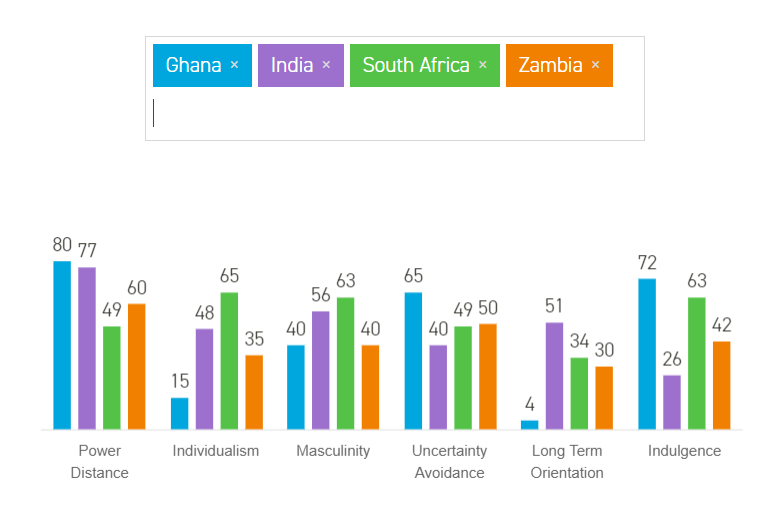Countries do business differently. Some better than others. In my experience, there’s a range of cultural differences that are important to think about when doing business in a different country. It’s fascinating to me how an interaction based on one premise goes over extremely well in Ghana but falls flat in Tanzania. While looking into this, someone sent me some research done by Hofstede Insights. They do a lot of work on culture in organizations and have expanded that out into countries. Here’s a relevant blurb from their site.
Please note that culture is defined as the collective mental programming of the human mind which distinguishes one group of people from another. This programming influences patterns of thinking which are reflected in the meaning people attach to various aspects of life and which become crystallised in the institutions of a society.
This does not imply that everyone in a given society is programmed in the same way; there are considerable differences between individuals. It may well be that the differences among individuals in one country culture are bigger than the differences among all country cultures. We can, nevertheless, still use such country scores based on the law of the big numbers, and on the fact, most of us are strongly influenced by social control. Please realise that statements about just one culture on the level of “values” do not describe “reality”; such statements are generalisations and they ought to be relative. Without comparison, a country score is meaningless.
To provide some more context here, they broke ‘culture’ down into six different tradeoffs or attributes. They then score the countries along these indices and measure them against each other. The results are revealing. Below are the six different attributes, and then the comparison of several countries I’ve recently worked in.
| Power distance index | How that society handles inequalities – higher score accepts hierarchy, lower score strive for equality. |
| Individualism vs. Collectivism | Individualism prefers looking after own, collectivism looks after society. |
| Masculinity vs. Femininity | Masculine prefers achievement, competition. Femininity prefers cooperation, caring. |
| Uncertainty avoidance index | The degree of comfort with uncertainty and ambiguity – higher score less tolerant of unknowns, lower scores more relaxed. |
| Long term vs. short term orientation | Higher scores encourage preparing for future, lower scores prefer traditions and norms. |
| Indulgence vs. restraint | Indulgence allows gratification of drives relating to enjoying life, restraint suppresses gratification and regulates it. |
The results speak for themselves and I think this is a tool to use when travelling to new countries for work. Try it out.
